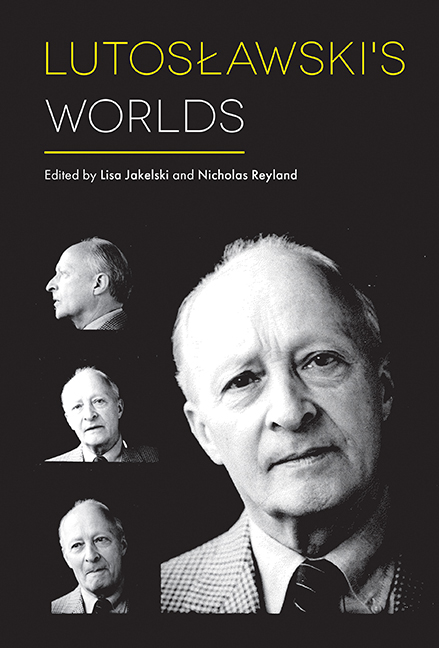Book contents
- Frontmatter
- Dedication
- Contents
- List of Figures
- List of Tables
- List of Music Examples
- List of Contributors
- Acknowledgements
- Introduction
- PART I mourning, modernism, and genius
- PART II other lutoslawskis
- PART III documents
- 8 Lutoslawski on Contemporary Music: Critical Commentary in Letters and Documents from the Lutoslawski Correspondence Collection
- 9 Witold Lutoslawski's Artistic Diary: An Unknown Document of the Composer's Creative Path
- 10 MAT. LUDOWE: The Lutos File
- PART IV political engagement
- PART V legacies
- Bibliography
- Index
9 - Witold Lutoslawski's Artistic Diary: An Unknown Document of the Composer's Creative Path
from PART III - documents
Published online by Cambridge University Press: 14 June 2019
- Frontmatter
- Dedication
- Contents
- List of Figures
- List of Tables
- List of Music Examples
- List of Contributors
- Acknowledgements
- Introduction
- PART I mourning, modernism, and genius
- PART II other lutoslawskis
- PART III documents
- 8 Lutoslawski on Contemporary Music: Critical Commentary in Letters and Documents from the Lutoslawski Correspondence Collection
- 9 Witold Lutoslawski's Artistic Diary: An Unknown Document of the Composer's Creative Path
- 10 MAT. LUDOWE: The Lutos File
- PART IV political engagement
- PART V legacies
- Bibliography
- Index
Summary
Writing on music was a special part of the creative activity of nineteenthcentury composers, as demonstrated by the achievements of Robert Schumann, Franz Liszt and particularly Richard Wagner, and it became particularly intensive in the twentieth century, when many representatives of the new music felt an overwhelming need to articulate their theoretical, technical and aesthetic standpoints. This tendency can be seen in Poland through the writings of Karol Szymanowski, yet – as far as Polish musical culture of the second half of the twentieth century is concerned – it was Witold Lutosławski who, along with Bogusław Schaeffer, emerged prominently as a writer on music. Lutosławski's texts are divided (one has to admit – quite disproportionately) into multi-thematically official (although not always published) writings, and those personal writings amongst which pride of place can be given to his ‘Notebook of Ideas’.
As I have written elsewhere:
from the very beginning of Lutosławski's activity as a writer (that is from the late 1930s), his texts revealed their idiosyncratic profile, which made them quite different from such prolific writers on music as Cage, Boulez, and Stockhausen. Whereas all three of these leading avant-garde writers openly proclaimed their aesthetic (or, as it is sometimes called, anti-aesthetic) manifestos and their radical attitudes, Lutosławski chose a pragmatic approach, addressing first and foremost practical problems in his own compositional technique. Thus his writings attempted to explain the concrete solutions in particular works in order to help listeners to understand them, rather than build a theory of aesthetics in their own right. Another difference between Lutosławski and the postwar avant-gardists is his attitude toward the idea of contemporary music. Being an enthusiast for it, he always kept a critical distance from the radical innovations, especially those that, in the process of musical communication, totally neglected feedback from the audience. This is why his texts often display a critical reappraisal of the basic tenets of both pre- and post-war avant-garde.
In the rich collection of Witold Lutosławski's manuscripts housed in the archive of the Paul Sacher Foundation in Basel there is a document of special, personal meaning. It is a kind of artistic diary that Lutosławski, who himself called it a ‘Notebook of Ideas’, kept more or less systematically from 1959 to 1984.
- Type
- Chapter
- Information
- Lutoslawski's Worlds , pp. 211 - 226Publisher: Boydell & BrewerPrint publication year: 2018

